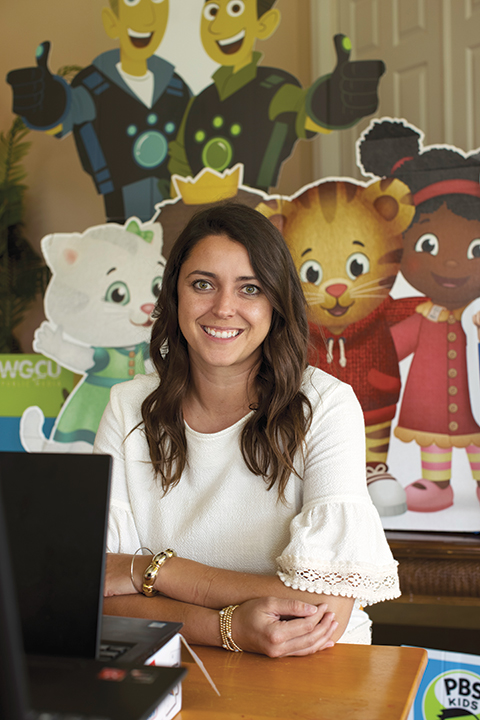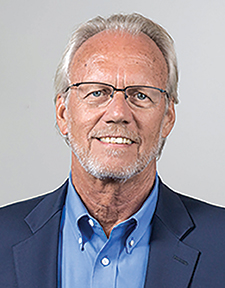If they didn’t know the statistic, it’s likely the caregivers in the audience knew from experience that children’s attention is fleeting. After all, they are the experts, Murray stressed. She was just there representing WGCU, providing information about resources available from Sesame Street in Communities (SSIC).
The program builds on 50 years of “Sesame Street” to offer information for teachers, parents and caregivers to help them discuss with children some of the difficult issues their families may be facing. The range of topics is vast, including divorce, food insecurity, parental incarceration and addiction, grief, homelessness, handling tantrums and dozens of others. Support materials offered by psychologists, educators and parents also address resilience issues such as being persistent, staying positive, building empathy and more. A companion website provides resources in English and Spanish, searchable by target age (0-1, 2-3, 4-6 and so on) and the time the lesson or activity should take (one to four minutes, four to 10 minutes and so on).

Before conducting a session, Murray meets with the child-care center or school directors (via Zoom) to find out what problems they need to address. “We’ll look at the website together and then take a deep dive into a particular topic,” Murray explained.
She dispenses this information in a combination of mom references, teacher- and doctorese, and TVspeak. She is uniquely qualified to do so, as an educator with a master’s degree who has written curriculum for PBS KIDS shows and launched the first workshops for SSIC for public station WNET in New York.
A Naples resident for four years and now a mother of daughters who are 4 and 5, Murray’s perspective has changed since she began conducting workshops for PBS KIDS before she had children. “The questions they (workshop participants) have are things I’m still asking myself. ‘Do they watch too much TV?’ ‘Is this show good and how do I tell?’”
She does see first-hand how the “Sesame Street” and PBS KIDS characters can help illustrate issues in a warm, non-threatening, safe way. Her daughters’ favorite characters are WordGirl and Daniel Tiger. Like other kids, and adults, too, they get invested in the characters they see on TV. “Parasocial relationships is the doctor term for this,” she said.
Murray cited research suggesting that 1 in 4 children today experience some kind of trauma, and plenty of others have to navigate situations that may not rise to the level of trauma but still are vexing and could easily interfere with their education. Sesame Street in Communities aims to empower all the adults in a child’s life to make a difference.
“Our teachers focus on preparing children academically, socially, behaviorally and emotionally for the future, but we also want to empower parents to excel at work and advance their education,” said Chris Hansen, CEO of Child Care of Southwest Florida. “We’re excited to participate in the Sesame Street in Communities program because it, too, recognizes the importance of a strong school-home connection in a child’s overall development.”
One common question from parents and caregivers recently became trickier to answer: The perpetual unknown of how much screen time a child should spend is harder to define in the pandemic. The American Academy of Pediatrics recently revised its guidelines from no screen time under age 2 to indicate that the youngest children can benefit from screen time spent connecting with relatives in faraway places, a concession during this public health crisis.
In addition, it has been clear for several years that the quality of screen time is most important.
In a time when teachers, caregivers and parents are forced by the pandemic and social distancing to rely on programs onscreen for even the youngest learners, WGCU and Murray are spreading the word about how that quality time can be spent.
Workshop participants seem to be listening. Murray talked about one result of a recent session.
“This group was so excited,” she said. “One mom went home and took out all the apps on her kid’s tablet and replaced them with PBS KIDS. She really took what we were saying to heart. I walked away on such a high from that workshop.”
For more information and materials parents can use at home, visit the SSIC website.[/vc_column_text][vc_column_text]
WGCU UPDATES
WGCU has been energetically seeking grants for outreach programs. The stations are always mindful of how much they depend on donations, and when there’s an opportunity to raise money through grants, they try to do so. Since July 1, 2020, largely through the efforts of Outreach Coordinator Anne Stavely, they have raised $148,500 through these businesses and organizations for the purposes listed.
- Community Foundation of Collier County – At-Home Learning
- Gulf Coast Community Foundation/Miriam P. Raines Charitable Fund – At-Home Learning and PBS LearningMedia Initiative
- PBS “Age of Nature” – Community engagement around the program
- WNET and THIRTEEN – “Becoming Helen Keller” – Engagement and content creation around upcoming documentary
- Arthrex – Family Learning Workshops
- Impact Media Partners “Inventing Tomorrow” – STEM- Aligned Teacher Training around the documentary
- WNET & Sesame Street Workshop – Sesame Street in Communities
- Anonymous Foundation – Two podcast workshops in partnership with Center for Autism and Related Disorders chapters throughout the state
- Move to Include – 18-month project stressing abilities, not disabilities, and inclusion of all people in all aspects of society
- Penn State University “Speaking Grief” – Virtual discussion and screening with Valerie’s House of Fort Myers
- PBS “Blood Sugar Rising” – Virtual screening and discussion with Diabetes Alliance Network

RICK JOHNSON RETIRES
WGCU General Manager Rick Johnson retired after 13 years. His career in broadcast media spans 52 years, with four decades and eight sets of call letters to his credit before joining WGCU in 2008.
“Rick Johnson is one of public media’s outstanding leaders – not just in Florida, but everywhere he has served,” said Patrick Yack, executive director of Florida Public Media. “Always dedicated to our mission, Rick has left an indelible mark on our craft and our profession.”
Corey Lewis, former station manager of WBUR in Boston, will succeed him.
FEWER INTERRUPTIONS
This fiscal year, WGCU reduced on-air pledge drives by 44 percent. This year there are nine single-day campaigns. With some greater sourcing of revenue and an ongoing focus on existing donors (who hear the message “Don’t wait until the drive, donate now”), the monthly campaigns aimed to increase the number of sustaining and new members with minimal program interruption. Interestingly, though, there are people who enjoy the frenzy of a fundraising day and like to hear their names called out on the radio, so some do wait until the on-air pledge days.[/vc_column_text]